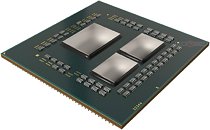Friday, May 24th 2019

AMD Zen 2 CPUs to Support Official JEDEC 3200 MHz Memory Speeds
An AMD-based system's most important performance pairing lies in the CPU and system RAM, as a million articles written ever since the introduction of AMD's first generation Ryzen CPUs have shown (remember the races for Samsung B-die based memory?). There are even tools that allow you to eke out the most performance out of your AMD system via fine memory overclocking and timings adjustment, which just goes to show the importance the enthusiast community derives from such tiny details that maximize your AMD Zen-based CPU performance. Now, notorious leaker @momomo_us has seemingly confirmed that AMD has worked wonders on its memory controller, achieving a base JEDEC 3200 MHz specification - up from the previously officially supported DDR4-2666 speeds in the first-gen Ryzen (updated to DDR4-2933 speeds on the 12 nm update).The importance of system memory for AMD lies in the fact that the CPU's CCXs use the memory bus as a way to calculate their Infinity Fabric speeds, which allows for inter-CCX communication - higher memory data rates thus equal higher CPU performance as a whole. The increase in the base JEDEC specification support means that AMD have worked on adding a little grunt to their memory controller which should help improve IPC due to increased Infinity Fabric capabilities. momomo_us also confirmed at least up to 4400 MHz OC "official" support from AMD, a far cry from current AMD Zen silicon - even in its 12 nm iteration. Let's wait to see if the current salty 5000+ MHz DDR4 speeds are indeed possible, come the product's launch.
Source:
User @momomo_us on Twitter


48 Comments on AMD Zen 2 CPUs to Support Official JEDEC 3200 MHz Memory Speeds
Every high speed PC ram modules out there are technically overclocked, and usually runs 1.35V or more.
Actual JEDEC spec aka non-overclocked DDR4 3200 chips do exist, but so far I have yet to see them on PC ram kits.
I would expect those are more expensive and only used for ECC-ram on servers, but older servers do not offically support DDR4 3200.
Man with ddr4 speed is just like achievable it wasnt as such with ddr3. I mean ddr4 crossed 5+ghz.
When you take that into account the % overclock of DDR4 vs DDR3 is not too impressive.
And why in terms of IC you speak ? Yeh i mean why would an IC be considered anyway its always the bus that counts. Isnt it?
The original target for DDR3 was 1600 and for DDR4 was 3200. DDR3 and even DDR2 did exceed that speed.
For DDR4 it has been years and we have yet to see any JEDEC spec PC ram over 2666 so far.
When you consider that many kits were overclock from DDR3 JEDEC 1600 to 2666, that is the same % increase from JEDEC 3200 to 5332.
So far for DDR4 neither of those speeds are common, and in the case of 5000+ pretty much requires extreme OC on the CPU.
Edit:
This is just on the frequency side of things.
When you also account for the actually Latency in ns, it really doesn't look too good.
This is one the many reasons why the actual performance difference isn't quite as good as the number would suggest.
I to am very excited, might make collecting Intel CPUs and a few motherboards even cheaper for me when the new AMDs come out and they are as powerful as they are being shown.. I cannot wait but I'm going to have to :laugh: :cry:
Wikipedia JEDEC for DDR4
I have to check on the JEDEC specified HyperX memory.
Edit: Found the HyperX Fury. Usually you have several JEDEC profiles (SPD Profiles) programmed into the memory. The highest SPD-Profile should be the 3200MHz one.
Spec sheet here:'
PDF file of the HyperX Fury memory
Has anyone have such modules?
I have seen the is even a JEDEC 3466 Spec. At least when you trust the Kingston Datasheets.
Datasheet
I think it is more likely that the 2933MHz is JEDEC spec, and the rest is XMP. And this also should be true for the 3200MHz Memory
If anyone find a dump of all speed profiles on such memory, let me know.
But it still looks more likely that the 2933MHz in the Kingston Modules are the JEDEC / SPD specs. And it even is the next one after 2666MHz. So it would be logical we have modules with 2933MHz at this time.
efikkan, check your computer with CPU-z. There you can see in the "SPD" tab what speeds and timings you memory is programmed with.
2 years after the launch Asrock are struggling with releasing a stable BIOS, where all features work as they should.
I dumped mine a long time ago and never looked back. I got sick of free beta-testing for them.
They had issues with VM, Linux, security patches, whatnot. You may want to pay their forums a visit to check further. IDK, they may have it fixed by now, but 2 years in a row they have had not.
P.S. sorry, didn't want to hijack the thread.
One big advantage of AsRock is, that they releases Bios update, beta and normal ones for Z87 and Z77, which enabled NVME support.
To bring it back to Ryzen CPUs. Does anyone know how the Memory support will scale on the 300 and 400 chipset when you run a Ryzen 3000 CPU? Would be interesting to see how fast you can get since the memory controller is in the CPU :)